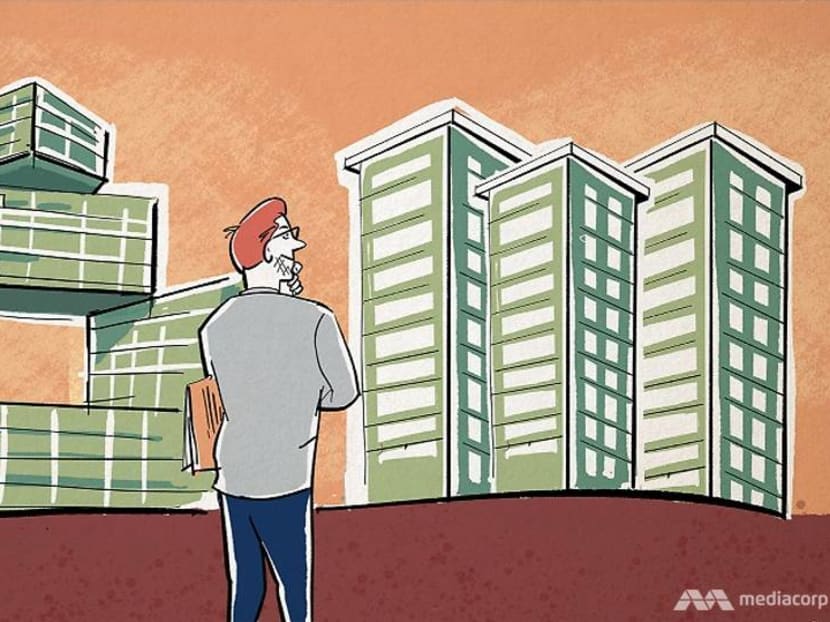A guide to choosing between an executive condominium and a private condominium
Here's how to navigate through the pros and cons between the two.

Choosing between and executive condo and a private condo. (Illustration: Jasper Loh)
An executive condominium (EC) comprises a strange yet potentially lucrative option for first time home buyers. Indeed, often lauded as the perfect home for the Singaporean sandwich class – those who essentially earn too much to qualify for an HDB but not quite enough to invest in a condo – the EC is a public-private hybrid reflecting both the attractive prices of public housing and the superior comfort of private condominiums.
The EC becomes an obvious choice for those Singaporeans who can afford a little more than an HDB but cannot stretch to a private apartment. However, if you are in the situation where your finances allow you to make a choice between an executive condominium and a private one, then the decision is a little tougher.
To this end, we shall lay out precisely in what scenario, and under what circumstances you may want to give executive condominiums a chance before rushing head over heels into the private sector.
WHO CAN BUY AN EC?
First off, an executive condominium comes with strings attached, and while a more in-depth account shall be provided later on, it is important to understand from the onset that some of the most stringent limitations ensure that a good amount of people cannot apply for this special type of flat to start with.
So, before we go any further let’s see if an EC is on the cards for you to begin with. You can apply if you meet the following criteria:
- Your household income must not be above S$14,000
- You are a Singaporean citizen
- You have not owned any property, locally or overseas, in the last 30 months and you do not own any property now
- You have not owned more than one HDB/DBSS or EC flat previously
You also have to fall under one of the following schemes, with at least one co-applicant being either a Singapore citizen or a Singapore permanent resident:
- Public Scheme: You apply either with your spouse (and children, if any), your parents (and siblings, if any), or solely with your children (granted that you have legal custody)
- Fiance scheme: You are applying with your fiance
- Orphan scheme: You are an orphan and you are applying with a sibling
WHY DO ECs EVEN EXIST?
While private condominiums have been part of the Singapore landscape since the early 1970s, executive condos are a relatively new invention, only joining the scene in the late 1990s. Singapore has, from its inception, followed a policy favouring home-ownership, and as the society developed a stronger middle class, new ways had to be found to house its increasingly affluent population.
Proverbially sandwiched between the public and private sector, the hybrid that is the executive condominium was thought up to form a bridge, catering to the upper middle class segment of society.
Similarities: Disregarding the rules and stripped of its public characteristics, the EC is in its physical form not just similar but absolutely identical to a condominium. It shares both in its enhanced comfort and rich variety of amenities such as swimming pools, private parks, tennis courts, 24/7 security and the like.
Differences: As for the differences, alas, you cannot have your cake and eat it too, at least not right away. While essentially synonymous in form, a framework of rules and regulations is attached to the executive condominium effectively differentiating it from their private counterparts.
The restrictions around the EC: Executive condominiums were designed to serve as homes rather than investment options. To this end, anyone who buys an EC has to live in it for at least five years before it can be sold on. Even after half a decade has passed, you are restricted in that you can only sell the flat to Singapore citizens or Singapore permanent residents.
Subsequently, HDB bars foreigners from buying executive condominiums for another five years. After a full decade has passed the executive condominium effectively transforms into a private condominium, and it may as such be sold to anyone on the free market.
To contextualise the measures a little, executive condominiums are state-subsidised and meant to enhance home-ownership for Singaporeans, not the investment opportunities for real estate moguls. As such, you will not be able to profit by buying a flat from the government and then selling it on when market prices surge. While it is a constraint, the Minimum Occupation Period (MOP) does not harm anyone who primarily views an EC as a roof over one’s head, and intends to actually live in it.
WHAT MAKES AN EC ATTRACTIVE?
One major factor enticing first time buyers to opt for an EC, rather than a private one is its relatively more attractive price tag. While it has differed considerably over time, executive condominiums can be as much as 25 per cent lower. Add to this the option to get a grant from HDB, and one starts to see why so many first timers go for an EC before they upgrade to a private condominium.
As noted before, after 10 years the executive condominium effectively turns into a private condominium. Seeing the lower price at which executive condominiums are bought, sitting out the 10 years makes for potential of substantive capital appreciation.
While the strings attached make it impossible for buyers to try and make a quick buck by buying and subsequently rapidly selling the flat, there is room for buyers to take advantage of long-term property appreciation. Boosted by a public-to-private property transition after 10 years, the EC generally sees relatively more appreciation than other private property, such a private condominiums.
A FINAL CAVEAT
Comparing and contrasting the pros and cons of an EC versus that of a private condo paints the picture of a pretty good deal in terms of the former. Unless you wish to sell your condo within a decade of buying it, the executive variant poises as a strong contestant, especially weighing up its attractive price and subsequent large potential for long-term capital gains. Still, there remains one last caveat: while private condominiums tend to be freehold, executive condominiums generally come with a 99 year lease.
Seeing that Singapore is a relatively young country, no property has yet come sufficiently close to the 99 year mark for anyone to start worrying about it, and price discrepancies between free and leaseholds haven’t really appeared yet. Still, if you have long, long, long-term plans for your property than an EC may lose some of its appeal. Otherwise, and with a bit of patience, executive condominiums tend to be a relatively great bargain, both in terms of living and capital gains
This story first appeared on 99.co.
Editor's note: This article has been updated by 99.co to remove incorrect information on the schemes potential buyers of executive condominiums must be eligible for.






